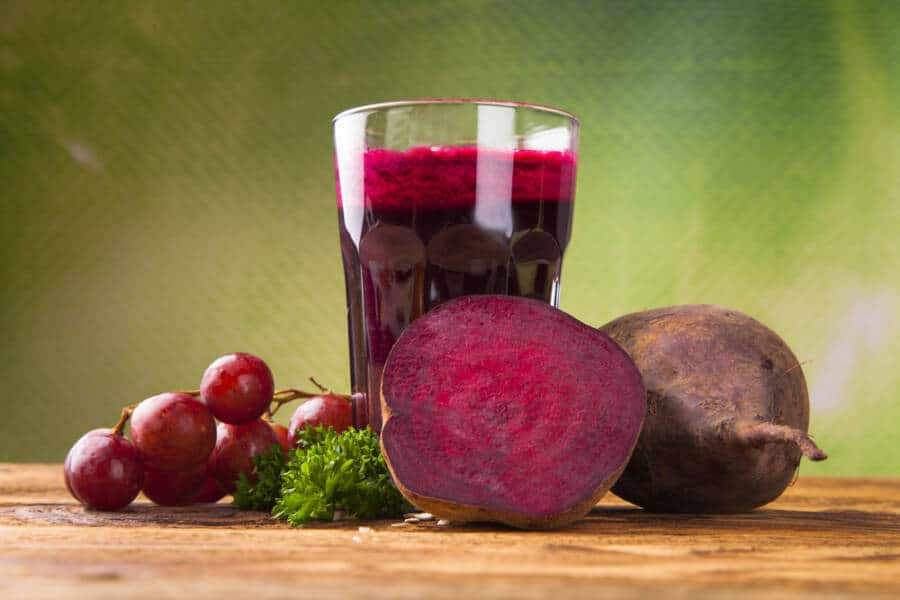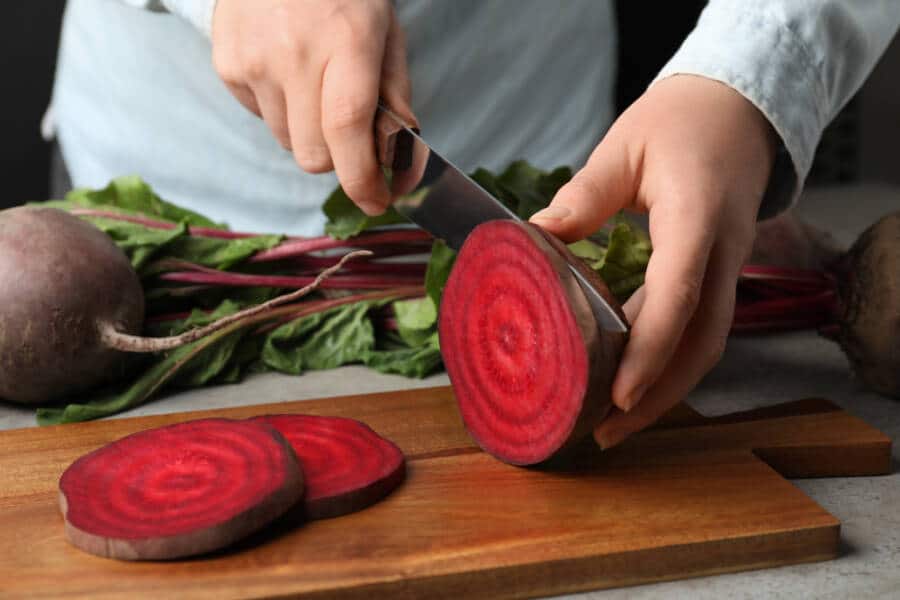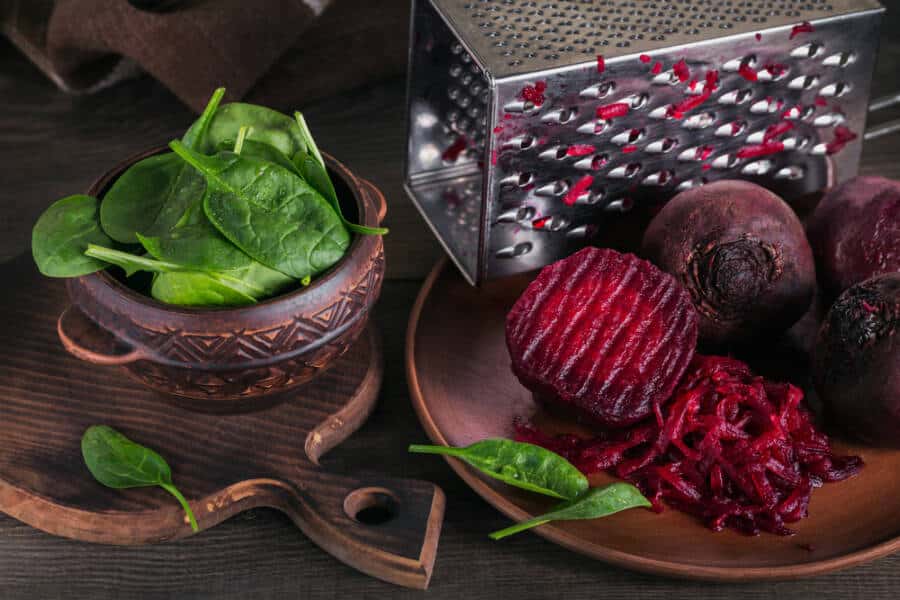Did you know about all these fantastic beetroot benefits?
If you’re looking for something low in calories but high in nutrients, look no further than the humble beet. A beetroot’s versatility in the kitchen knows no bounds, whether pickled, roasted, or grated raw.
Beyond its aesthetic appeal, though beetroot benefits, it is a powerhouse veggie that deserves a place on your plate. From its ability to improve cardiovascular health to its high nutrient content, beetroot is a wholesome food that can be both nutritious AND tasty.
They boast folate, potassium, fiber, nitrates, magnesium, vitamin C, and so much more. And the best part is that you can even find them canned, roasted, and in juice form to make it easier on you.
The vegetable itself comes in several different varieties, each slightly different in offering beetroot benefits. The red and purple varieties are high in an anti-inflammatory compound known as betalains, which also give beets their deep red color.
Then, yellow and golden beets possess a different group of betalains called betaxanthins. Finally, you can also find beet greens, the leafy tops of the beet plants that are edible and offer tons of B vitamins.
And if everything you just read hasn’t convinced you yet, here are 8 other nutritious reasons to include beets into your regular diet.

Beetroot benefit: Helps fight inflammation
Beets contain pigments called betalains, which possess several anti-inflammatory properties. This could benefit several aspects of an aging adult’s health because as we know, chronic inflammation has been linked to conditions like heart disease, liver disease, obesity, and cancer.
A study in 24 people with high blood pressure revealed that consuming 8.5 ounces of beet juice for two weeks significantly decreased several markers of inflammation, including tumor necrosis factor-alpha and C-reactive protein.
An older study in people with osteoarthritis indicated that betalain capsules made with beetroot extract decreased pain and discomfort. Beetroot juice and extract have also been proven to decrease kidney inflammation in rats that were given harmful chemicals.
Still, more human studies are neccessary on humans to determine whether enjoying beets in average amounts as part of a healthy diet may provide the same anti-inflammatory benefits.
Beetroot benefit: It supports brain health
Mental and cognitive functions unmistakably decline with age, which can raise the risk of neurodegenerative disorders like dementia.
The nitrates found in beetroot can improve brain function by boosting the dilation of blood vessels and, therefore, improving blood flow to the brain.
Specifically, beets have been proven to improve blood flow to the brain’s frontal lobe, an area linked to higher-level thinking like working memory and decision-making.
Also, an older study in those with type 2 diabetes discovered that reaction time during a cognitive function trial was 4% faster in individuals who consumed 8.5 ounces of beetroot juice every day for two weeks compared with a control group.
Nevertheless, more research is needed to determine whether or not beets can truly improve brain function and lower the risk of dementia among the general public.
Beetroot benefit: It can help keep your blood pressure in check
Beets have been well-researched for their ability to lower elevated blood pressure levels, a significant risk factor for heart disease. Some studies have even shown that beetroot juice could significantly lower diastolic and systolic blood pressure levels.
The effect is more critical for systolic blood pressure when a person’s heart contracts than diastolic blood pressure when it’s relaxed. Also, it is believed that raw beets may exert a more substantial effect than cooked ones.
These blood-pressure-lowering effects are likely due to this root vegetable’s high concentration of nitrates. In our bodies, dietary nitrates are converted into nitric oxide, which opens up your blood vessels and helps blood pressure levels decline.
Another beetroot benefit is that it’s a fantastic source of folate. And even though research has mixed results, several studies indicate that increasing folate intake could significantly lower your blood pressure levels.
Just remember that the effect of beets on blood pressure is only temporary. It would be best if you consumed them regularly to experience heart-health benefits long-term.

Beetroot benefit: Can help balance your energy levels
Beets have quite a few nutritional properties that could potentially make them a fantastic addition to a balanced diet. To start, they’re low in calories and fat but high in water, which can aid in balancing your energy intake.
Boosting your intake of low calorie foods like beetroot has also been linked with weight loss. Also, despite having a low calorie content, this veggie contains moderate amounts of fiber and protein.
Both of these nutrients can make it much easier for you to achieve and maintain a reasonable weight. The fiber in beets might also decrease appetite, support digestive health, and promote overall feelings of fullness, ultimately decreasing your overall calorie input.
Besides that, by including them in smoothies or any other favorite recipes, you can easily increase your intake of fruits and veggies to improve the quality of your diet.
Beetroot benefit: It can help manage diabetes
Even though it may be naturally sweet, beetroot has a low glycemic index, which means it only has a minimal impact on your blood sugar levels.
Also, the fiber and nitrate content in beetroot can help manage your blood sugar levels and improve insulin sensitivity, making it a diabetic-friendly food choice when consumed in moderation.
Beetroot benefit: It might improve your gut health
A single cup of beetroot contains 3.4 grams of fiber, making beets a fantastic fiber source. Why should you care? Well, fiber bypasses digestion and goes to the colon, providing friendly gut bacteria and adding bulk to stools.
This can boost digestive health, keep you regular, and prevent digestive conditions such as inflammatory bowel disease, constipation, and diverticulitis.
Fiber has also been connected to a decreased risk of chronic illnesses. This includes type 2 diabetes, heart disease, and colon cancer.
Beetroot benefit: Might have anti-cancer properties
Beetroot contains quite a few compounds with cancer-fighting properties, including betaine, rutin, ferulic acid, kaempferol, and caffeic acid.
Even though more research might be needed, test-tube studies have demonstrated that beetroot extract can delay the growth and division of cancer cells.
A few other studies have also discovered that having higher blood levels of betaine could be linked to a lower probability of developing cancer.
Nevertheless, it’s important to note that most studies have used isolated compounds instead of beetroot. So, further research on the consumption of beetroot as part of a well-balanced diet and cancer risk is required.

Beetroot benefit: Can improve cardiorespiratory performance
A few studies suggest that dietary nitrates like those found in beets might enhance athletic performance. Nitrates impact physical performance by enhancing the efficiency of mitochondria, which create energy in one’s cells.
According to a review, beetroot juice could boost endurance by increasing how long it takes to become depleted, boosting cardiorespiratory performance, and improving efficiency for athletes.
Likewise, beet juice has also been proven to improve cycling performance and increase oxygen use by up to 20%.
It’s important to note that blood nitrate levels peak within 2 to 3 hours of consuming beets. So, consuming them a couple of hours before competing or training is best to maximize their possible benefits.
So what do you think about these beetroot benefits? Are you ready to incorporate some into your diet? If you don’t know where to begin, try some beetroot juice first, and go from there.
And if you liked this article, we highly recommend also reading: 9 Potentially Harmful Vitamins That Can Threaten Your Health














One Response
Are all the same benefits available from beetroot powder?